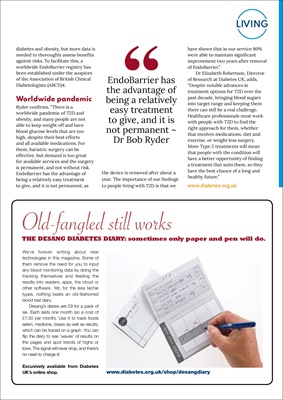
27
LIVING
EndoBarrier has
the advantage of
being a relatively
easy treatment
to give, and it is
not permanent ~
Dr Bob Ryder
Old-fangled still works
We're forever writing about new
technologies in this magazine. Some of
them remove the need for you to input
any blood monitoring data by doing the
tracking themselves and feeding the
results into readers, apps, the cloud or
other software. Yet, for the less techie
types, nothing beats an old-fashioned
blood test diary.
Desang's diaries are £9 for a pack of
six. Each lasts one month (so a cost of
£1.50 per month). Use it to track foods
eaten, medicine, doses as well as results,
which can be traced on a graph. You can
flip the diary to see 'waves' of results on
the pages and spot trends of highs or
lows. The signal will never drop, and there's
no need to charge it!
Excusively available from Diabetes
UK's online shop.
THE DESANG DIABETES DIARY: sometimes only paper and pen will do.
www.diabetes.org.uk/shop/desangdiary
diabetes and obesity, but more data is
needed to thoroughly assess benefits
against risks. To facilitate this, a
worldwide EndoBarrier registry has
been established under the auspices
of the Association of British Clinical
Diabetologists (ABCD)4.
Worldwide pandemic
Ryder confirms, "There is a
worldwide pandemic of T2D and
obesity, and many people are not
able to keep weight off and have
blood glucose levels that are too
high, despite their best efforts
and all available medications. For
them, bariatric surgery can be
effective, but demand is too great
for available services and the surgery
is permanent, and not without risk.
EndoBarrier has the advantage of
being a relatively easy treatment
to give, and it is not permanent, as
have shown that in our service 80%
were able to maintain significant
improvement two years after removal
of EndoBarrier."
Dr Elizabeth Robertson, Director
of Research at Diabetes UK, adds,
"Despite notable advances in
treatment options for T2D over the
past decade, bringing blood sugars
into target range and keeping them
there can still be a real challenge.
Healthcare professionals must work
with people with T2D to find the
right approach for them, whether
that involves medications, diet and
exercise, or weight loss surgery.
More Type 2 treatments will mean
that people with the condition will
have a better opportunity of finding
a treatment that suits them, so they
have the best chance of a long and
healthy future."
www.diabetes.org.uk
the device is removed after about a
year. The importance of our findings
to people living with T2D is that we